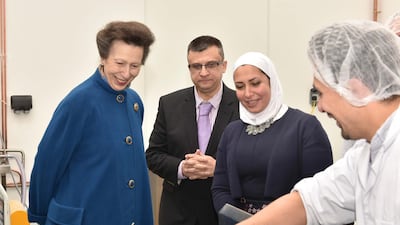A Syrian family have overcome war, floods and public rejection on a top-rated British television show to build an award-winning cheese-making business after fleeing unrest in Damascus.
Razan Alsous and her husband Raghid Sandouk lost virtually everything including a thriving laboratory supplies business when they packed their suitcases and left Syria with their three young children in 2012.
Their flight was prompted by a car bombing outside Mr Sandouk’s office in Damascus after an apparent assassination attempt of a neighbour.
The bomb was placed close to where Mr Sandouk usually parked his car. He had just returned from buying milk and had switched on the kettle when the explosion rocked his building, his wife said.
The family – including one child aged 10 months – travelled to the UK via Lebanon and Turkey in search of a safe place to bring up their children and use Mr Sandouk’s industry contacts to rebuild their lives.
Mr Sandouk, an electronic engineer who employed 20 people in Syria importing laboratory equipment for universities and food manufacturing businesses, had suffered significant losses after his imported stock was stolen from storage units during turmoil in the country.
The thefts and losses from Syria’s plunging currency meant that the couple were left with few assets as they set up home in the northern English town of Huddersfield, Yorkshire.
While Mr Sandouk tried to rebuild his business, his wife, 36, found redemption on a shopping trip in their new home when she struggled to find halloumi cheese that she ate every morning while living with her family in a village just outside of Damascus.
Ms Alsous, who had studied microbiology in Syria, turned her hand to developing her own version and experimenting with the plentiful supplies of cows’ milk from the countryside farms of her new home.
“We have the oil in the Middle East. Here in Yorkshire it’s the milk,” she said. “We are living in a place that’s the most amazing source of milk, so I thought: ‘why not?’
“I started to search for recipes, I had never made cheese in the whole of my life before,” she said. “I did my experiments at home with my husband being the taster.”
The fruits of her labours were rewarded in 2014 with approval from food regulators. She started production with the help of a £2,500 grant.
With little money to invest, a fish tank, ham glazing machine and ice cream maker were all modified by Mr Sandouk, 55, to make the cheese that is now sold at markets, small outlets and by one large retailer.
“In our strategy we dream as millionaires, then we break our dream into reality and steps that we take one by one,” said Ms Alsous.
Their attempts to upgrade their equipment suffered a blow when they were rejected by a panel of entrepreneurs on a British television show, Dragons’ Den.
The couple were seeking £100,000 for a ten per cent share in their business, valuing it at £1 million, but were told they had overvalued their company.
The entrepreneurs also believed they would struggle to sell their products that could not be branded as halloumi under trademark rules to protect the industry in Cyprus, the largest producer of the cheese in the 27-nation European Union.
Despite the rejection, the business has continued to grow and have bought new kit to expand their sales of their “squeaky cheese” and other products to reach £250,000 last year, said Ms Alsous.
The couple’s company, Yorkshire Dama Cheese, reflects their life in their homeland with the blue packaging symbolising the waters of the Mediterranean. The logo of a Phoenician vessel reflects the region’s trading heritage.
But this year, production has been hit by ferocious weather that flooded their factory for several weeks and the Covid-19 pandemic which has kept their seven-strong staff off work.
Despite the problems, Ms Alsous sees no imminent return to Syria, with her children aged seven, eight and 11 seeing the UK as their home. Members of her family have joined them in Yorkshire including one brother who works with them in their factory.
Even if she will not return permanently, her ambition is to export her cheese to the Middle East. “Why not? We are importing the oil,” she said. “Each place needs to do what they are good at. You don’t need to have gold everywhere - the treasure here is the milk.”


